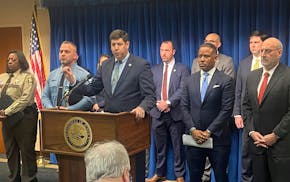Hennepin County residents can face long wait times when applying for public assistance programs intended to help the community's most vulnerable in times of crisis.
In 2024, average wait times for county employees to process applications for safety net programs like food stamps, cash assistance and housing aid often were over a month, data through August from the human services department shows.
Applicants and case workers say staffing shortages combined with a complex system for vetting requests means residents may wait days or weeks past the 30-day goal county officials have for processing most applications.
Demand for aid programs is typically highest at the beginning of the year, and some fear 2025 will bring another backlog of applications.
"Every time I talked to someone, they said they were backed up. They passed me off to someone else," said Katelin Handy, a Minneapolis resident who visited the human services center on Lake Street recently.
Earlier this year, her application for the Minnesota Family Improvement Program, which provides cash assistance to families with children, took almost two months to be processed, Handy said. Now she's waited over a month for a response to her request for rental assistance.
"My landlord just told me I have two weeks before I get evicted," she said.
County leaders acknowledge problems with the application system for public benefits, including long wait times, a challenging phone system and an online portal that can be tough to navigate. They've hired staff and tried to otherwise improve the system to make it function more quickly.
"We are going to keep staffing up and making sure we have the right people in the right places," said Commissioner Angela Conley, who chairs the County Board's health and human services committee.
"We are seeing an influx of people, and that speaks to how people are unable to afford their lives right now," said Conley, who acknowledged the long waits could mean some residents losing housing, forgoing medical care or going hungry. "We don't want that to happen."
What residents are experiencing
Extended wait times for public support applications have been an issue for years in Hennepin County, and human services officials say they are not the only jurisdiction struggling to keep up. A big driver is demand; the number of applications has soared since the coronavirus pandemic and staffing has not kept pace.
In 2020, the county had an average of 515 staffers processing applications, while this year, the average has fallen to 463 workers. The number of applications has grown 57% since 2020, with more than 175,000 requests filed this year.
New employees take six months to a year to fully train on complex government systems. In a competitive job market, attrition has been a problem, too.
Meanwhile, the county moved to a state-run website to take applications in 2021 but still uses legacy computer systems that are not fully compatible, so considerable information has to be re-entered by hand. Applicants often need to upload various forms to determine their eligibility, and they say the website can be tricky to use.
Finally, most applications require a phone interview, and if an applicant misses a call from a case worker, they have to call back and often sit on hold. Earlier this year, the county's phone lines were open from 9 a.m. until 3 p.m.
Times were extended by an hour this summer. However, callers can only stay on hold for two hours; after that, to many applicants' frustration, the system automatically hangs up.
County data shows hold times averaged about 8 minutes in January 2020, when the system received about 26,000 calls. This January, the average wait was over 30 minutes, and the system logged 37,000 calls.
Some applicants say they've waited much longer.
Grace Baltich, a social worker and leader of the union that represents human services workers, says staffing shortages, technology challenges and long waits on the phone to connect with case workers have exacerbated delays.
"A lot of the people who use economic supports are very poor or have disabilities and may not have the resources or capacity to utilize online technology to complete applications," Baltich said.
The county needs to improve pay to attract and retain staff while streamlining the application system and making more case workers available in person to applicants, she said. Otherwise, residents' frustrations will continue, and that takes a toll.
"It's very toxic to your mental health, and that comes through to our workers, the frustrations that our clients have," Baltich said.
Latrice Opokumanu experienced that firsthand. After struggling with the phone system, she visited a county human services center to speak with a case worker in person.
She had to wait there, too, but she was able to resolve her issue. "I was on hold for two hours. My phone died," Opokumanu said.
How county officials are responding
Regina Wagner, the county's director of economic support, said the county is committed to improving the application system and shortening processing times. That includes constantly examining metrics to be "nimble" and respond to changing demands.
"We need to do better for residents, and there are a lot of things we have in motion to make the experience less frustrating and more beneficial and eliminate the need for repeat calls," Wagner said. "We know the phone experience has not been all that it should be for our residents."
They've hired more than 100 people this year to work on applications and are trying to streamline the training process so those new employees can have a quicker impact, Wagner said.
The County Board recently approved 4% wage increases each of the next three years for workers. That is on top of 3% annual merit pay increases employees are eligible for annually if they are not at the top of the pay scale for their position.
County officials are working to update the phone system so applicants can more easily connect with the correct staff. There also are more case workers at the county's five human services centers to help applicants in person.
That's welcome news to residents like Misty Reed, of Mound, who is homeless and stopped by a service center recently to check on her food stamp application. She said trying to apply online and over the phone was both frustrating and anxiety-inducing.
"It's good to talk to someone face to face," she said.

Minnesota Muslims celebrate Eid al-Adha. What is the holiday?

Accomplished climber, photographer who recently moved from St. Paul missing on mountain

Walz: State had no advance notice of federal raid in Minneapolis

DOGE cuts federal money for upgrades at Velveeta plant in New Ulm

